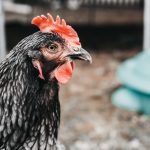Free range chickens provide numerous advantages for both the animals and the environment. These chickens have access to a more diverse diet, resulting in potentially healthier and more flavorful eggs and meat. They can engage in natural behaviors like scratching and pecking, which may contribute to better muscle development and overall health.
The environmental impact of free range chickens can be positive. Their foraging habits can help control pest populations, potentially reducing the need for chemical pesticides. Their manure serves as a natural fertilizer, enriching soil and promoting plant growth.
This approach to poultry farming is generally considered more sustainable and environmentally friendly. Free range chickens typically experience lower stress levels and improved welfare compared to confined poultry. This improved quality of life may lead to higher quality eggs and meat production.
Additionally, free range chickens often have a lower risk of disease transmission due to reduced confinement, which can decrease the likelihood of illnesses spreading rapidly through the flock. These benefits contribute to a more ethical and sustainable approach to poultry farming, potentially improving the quality of products for consumers while prioritizing animal welfare and environmental considerations.
Table of Contents
Key Takeaways
- Free range chickens provide natural pest control by eating insects and small rodents, reducing the need for chemical pesticides.
- Snakes are important for controlling rodent populations and are generally shy and non-aggressive towards humans.
- Free range chickens can help keep snakes away by making the environment less attractive for them due to their constant movement and noise.
- Chickens and snakes have a complex relationship, with chickens being potential prey for snakes but also capable of defending themselves and their territory.
- Understanding natural predator-prey dynamics can help in creating a balanced and harmonious ecosystem on your property.
- To keep snakes away from your property, you can use natural deterrents like essential oils, keep your property clean and clutter-free, and seal any potential entry points for snakes.
- Free range chickens also provide benefits such as healthier eggs, meat, and soil, as well as a more sustainable and ethical farming practice.
Snakes and Their Behavior
Thermoregulation and Locomotion
They are ectothermic, meaning they rely on external sources of heat to regulate their body temperature. This often leads them to bask in the sun or seek out warm areas such as rocks or pavement. Additionally, snakes are known for their unique method of locomotion, using their muscles and scales to propel themselves forward in a smooth and efficient manner.
Diet and Hunting Strategies
Snakes have a diverse diet, with some species being specialized feeders while others are generalists. Many snakes are carnivorous, feeding on a variety of prey including rodents, birds, amphibians, and insects. Some larger species of snakes are even capable of consuming larger prey such as rabbits or other snakes. Additionally, snakes have developed a range of hunting strategies, from ambush predation to active pursuit, allowing them to effectively capture their prey in a variety of environments.
Adaptation and Sensory Abilities
Snakes have a remarkable ability to adapt to their surroundings, with many species being highly adept at camouflage and stealth. This allows them to blend into their environment and remain undetected by potential predators or prey. Additionally, snakes have a unique sensory system that allows them to detect prey through heat-sensing pits or by using their tongue to pick up scent particles in the air.
Do Free Range Chickens Keep Snakes Away?

There is a common belief that free range chickens can help keep snakes away from a property. This belief is based on the idea that chickens are natural predators of snakes and will actively hunt and kill them. While it is true that chickens are opportunistic feeders and may consume small snakes if given the opportunity, the idea that they actively seek out and eliminate snakes from an area is largely a myth.
In reality, the relationship between chickens and snakes is more complex. While chickens may show some interest in small snakes as potential prey, they are unlikely to actively seek out and eliminate snake populations from an area. Additionally, many species of snakes are capable of defending themselves against potential predators, making them a less appealing target for chickens.
Overall, while free range chickens may have some impact on snake populations through predation, they are unlikely to serve as an effective means of keeping snakes away from a property. On top of that, it is important to consider the potential risks associated with encouraging chickens to actively hunt snakes. Some species of snakes are venomous and pose a threat to both humans and animals.
Encouraging chickens to engage with potentially dangerous snakes could put them at risk of injury or even death. Therefore, it is important to approach the idea of using free range chickens as a means of snake control with caution and consideration for the potential risks involved.
The Relationship Between Chickens and Snakes
The relationship between chickens and snakes is complex and multifaceted. While it is true that chickens may consume small snakes if given the opportunity, the idea that they actively seek out and eliminate snake populations from an area is largely a myth. In reality, the presence of chickens may have little impact on snake populations in a given area.
Furthermore, some species of snakes are capable of defending themselves against potential predators, making them a less appealing target for chickens. Additionally, many species of snakes are adept at remaining undetected through camouflage and stealth, making it difficult for chickens to locate and eliminate them. Overall, while there may be some interaction between chickens and snakes, it is unlikely that chickens serve as an effective means of controlling snake populations.
On top of that, it is important to consider the potential risks associated with encouraging chickens to actively hunt snakes. Some species of snakes are venomous and pose a threat to both humans and animals. Encouraging chickens to engage with potentially dangerous snakes could put them at risk of injury or even death.
Therefore, it is important to approach the idea of using free range chickens as a means of snake control with caution and consideration for the potential risks involved.
Natural Predator-Prey Dynamics
In natural ecosystems, predator-prey dynamics play a crucial role in maintaining balance and stability within ecological communities. Predators help control prey populations, preventing overgrazing or overpopulation of certain species. This in turn can have cascading effects on other species within the ecosystem, influencing food webs and community structure.
Furthermore, predators can also influence the behavior and ecology of their prey species. Prey animals may develop strategies to avoid predation, such as increased vigilance or changes in habitat use. This can lead to shifts in community dynamics and interactions between species.
Additionally, predators can also influence the genetic composition of prey populations through selective predation, leading to changes in traits such as coloration or behavior. Overall, predator-prey dynamics play a crucial role in shaping ecological communities and maintaining balance within ecosystems. By controlling prey populations and influencing the behavior and ecology of their prey species, predators help maintain biodiversity and stability within natural environments.
Tips for Keeping Snakes Away from Your Property

Remove Hiding Places
One effective strategy is to remove potential hiding places for snakes by keeping your property well-maintained and free of debris such as woodpiles or overgrown vegetation. By eliminating these hiding spots, you can reduce the likelihood of snakes taking up residence on your property.
Seal Off Entry Points
Additionally, sealing off potential entry points into your home or outbuildings can help prevent snakes from gaining access to these areas. This can be done by repairing any cracks or gaps in foundations or walls, as well as ensuring that doors and windows are properly sealed. By limiting access points for snakes, you can reduce the likelihood of encountering them in close proximity to your living spaces.
Control Food Sources
Furthermore, keeping your property free of potential food sources for snakes can help discourage their presence. This can be achieved by controlling rodent populations through effective pest management strategies such as trapping or exclusion. By reducing the availability of prey animals, you can make your property less attractive to snakes.
By taking these steps, you can help reduce the likelihood of encountering snakes on your land.
Other Benefits of Free Range Chickens
In addition to their potential impact on snake populations, free range chickens offer a wide range of benefits for both the animals themselves and for those who consume their products. By allowing chickens to roam freely and engage in natural behaviors such as scratching and pecking, free range farming can lead to healthier and more flavorful eggs and meat. Additionally, free range chickens have been shown to have higher levels of certain nutrients such as omega-3 fatty acids compared to their confined counterparts.
Furthermore, free range farming offers a more sustainable and environmentally friendly approach to poultry production. By allowing chickens access to natural forage and reducing reliance on chemical pesticides and fertilizers, free range farming can help promote healthy ecosystems and reduce environmental impact. Additionally, free range farming can provide economic benefits by supporting local agriculture and promoting sustainable land use practices.
On top of that, free range farming offers ethical benefits by providing animals with improved welfare compared to conventional confinement systems. By allowing chickens the freedom to move around and engage in natural behaviors, free range farming can reduce stress and improve overall well-being for the animals involved. This can lead to higher quality products as well as a more ethical approach to poultry production.
Overall, free range chickens offer a wide range of benefits for both the animals themselves and for those who consume their products. From improved nutritional quality to environmental sustainability and ethical considerations, free range farming offers a holistic approach to poultry production that can benefit animals, consumers, and the environment alike.
If you’re interested in learning more about keeping chickens and their potential benefits, you might want to check out this article on Producers Pride Sentinel Chicken Coop. It discusses the advantages of using a specific type of chicken coop and how it can benefit both the chickens and their owners.
FAQs
What are free range chickens?
Free range chickens are poultry that are allowed to roam freely outdoors, rather than being confined to a coop or small enclosure. They have access to natural vegetation, insects, and other food sources, and are able to exhibit natural behaviors such as scratching and dust bathing.
Do free range chickens keep snakes away?
There is some anecdotal evidence to suggest that free range chickens can help deter snakes from entering a property. Chickens are known to be natural predators of snakes, and their presence may discourage snakes from coming too close to the coop or other areas where the chickens roam.
How do free range chickens deter snakes?
Chickens are known to peck and harass snakes, and their presence can create a noisy and active environment that may be unappealing to snakes. Additionally, the scent of chickens and their droppings may also deter snakes from entering an area.
Are free range chickens a guaranteed method of snake control?
While free range chickens may help deter snakes, they are not a foolproof method of snake control. Some snakes may still enter a property despite the presence of chickens, and certain species of snakes may not be deterred by the presence of poultry.
What other methods can be used to keep snakes away?
In addition to free range chickens, property owners can take other measures to deter snakes, such as keeping the property free of debris and clutter, sealing up potential entry points, and using snake repellents or traps. It’s important to research and implement multiple strategies for effective snake control.
Meet Walter, the feathered-friend fanatic of Florida! Nestled in the sunshine state, Walter struts through life with his feathered companions, clucking his way to happiness. With a coop that’s fancier than a five-star hotel, he’s the Don Juan of the chicken world. When he’s not teaching his hens to do the cha-cha, you’ll find him in a heated debate with his prized rooster, Sir Clucks-a-Lot. Walter’s poultry passion is no yolk; he’s the sunny-side-up guy you never knew you needed in your flock of friends!







